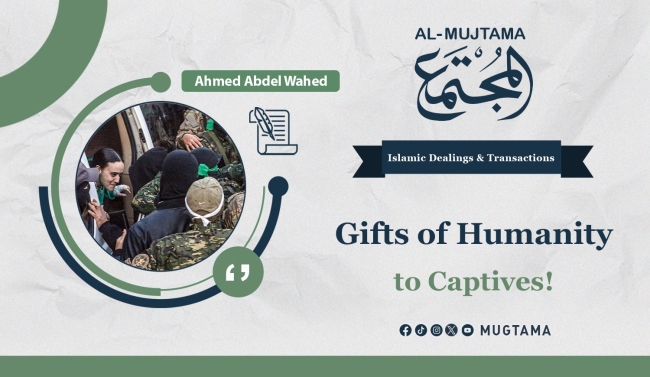Gifts of Humanity to Captives!
The scene of the souvenirs presented by the Islamic Resistance Movement (Hamas) to the three “Israeli” female captives who were recently released carries profound implications and conveys humanitarian messages that surpass any political symbolism.
I may not be exaggerating when I say that the gesture of giving gifts was a remarkable move by the Palestinian resistance, demonstrating its refinement, high morals, and respect for human dignity—even toward enemies or captives—when compared to an oppressive occupier who has killed infants, children, women, the elderly, and the sick, burned everything to the ground, and demolished mosques, churches, schools, and hospitals.
After more than 15 months of war, 471 days of genocide, bombings, and destruction, over 150,000 martyrs and wounded, an estimated 40 million tons of rubble, and heaps of decaying corpses and torn body parts—then you present gifts to your opponent. Why? How? And for what purpose?!
The “bizarre gift bags,” as described by the “Israeli” press, were almost like a sign of a moral victory for the Palestinians. They indicated that Palestinians had not lost their composure or resilience. They still possessed creativity, the ability to think outside the box, and even to astonish their enemy with something new.
Inside the gift bags were a map of the Gaza Strip, photos of the captives' memories during their imprisonment, and a release certificate titled "Prisoner Release Decision," which included the prisoner's name, age, date of captivity, birthdate, and release date, stamped with the seal of “Al-Qassam Brigades.”
The Palestinians achieved victory through the scene of these gifts—on humanitarian, psychological, moral, literary, and military levels. They insist on humiliating the occupier, exposing its crimes, and fraying its nerves, while simultaneously sending a positive message to their own captives: “Our humanity triumphs over you despite your occupation of our land, your desecration of our holy sites, and your destruction of our people.”
“I am human” is the overarching title of what the resistance accomplished, transcending the idea that it was merely a strategic tactic, media maneuver, or political message. It was a scene that demonstrated to the world the nobility, integrity, and chivalry of the Palestinian people.
The gift bags carried profound messages of da'wah, as the captives appeared in the best possible condition—wearing clean clothes, with braided hair, and in good health. This confirmed that the Palestinian mujahid had not forgotten his Islamic faith and the teachings of the Prophet Muhammad ﷺ concerning the treatment of captives, which include protecting their rights, honoring them, clothing them, and refraining from starving, torturing, insulting, or humiliating them.
Part of this excellent treatment was what “Al-Qassam” did by giving gifts to a human being who might one day embrace Islam, become neutral, or reconsider their hostile stance toward a people who rightfully own this land. At the very least, it serves as a reminder of the good treatment they received during captivity from people whom the Western Zionist propaganda machine portrays as extremists and terrorists—only for these captives to find themselves receiving gifts from those same people.
The souvenir gift bags affirmed the Palestinian resistance's commitment to international treaties, the principles of international law during wars and conflicts, and the Geneva Conventions regarding the treatment of prisoners of war—laws and norms that the Zionist enemy and its fascist government, implicated in war crimes against humanity, have not abided by.
The scene of the captives smiling as they left imprisonment and received their release certificates is clear evidence of the good treatment they received. One of the released captives even appeared wearing a necklace adorned with the Palestinian flag.
The individual capable of such a noble gesture and innovative step is indeed capable of rebuilding Gaza, nurturing it with goodness, healing wounds, gathering the scattered, clearing the rubble, and erasing the traces of brutal aggression—if only circumstances permit and resources are made available.
Reconstruction starts with people. The prisoners' gift bags send a message to the entire world that it is witnessing a great generation of humanity, a unique type of people, and pure human genes combining the morals of Islam, the authenticity of the Arabs, and the virtues of humanity. This affirms the legitimate right of these people to liberate their land and holy sites, and to achieve freedom and dignity without needing decisions from the Security Council, the United Nations, or the International Criminal Court, whose ink has failed to stop the bloodshed over 471 days!
The Palestinians have advanced significantly beyond what is written in the sciences of war, politics, economics, psychology, sociology, and human development—demonstrating legendary resilience, determined resistance, heroic patience, ambitious hope, innovative tactics, meticulous preparation, and remarkable planning and execution. This epic saga will be immortalized in history by those who did not forget to present gifts to captives.
Defiant Gaza deserves a serious stand and a popular, Arab, Islamic, and international mobilization for reconstruction—not just because it has been destroyed and turned into rubble, but because it is home to human beings whose humanity has grown so immense that they have triumphed over their enemies and taught the world the art of humanity.
-------------------------------------------------------------


